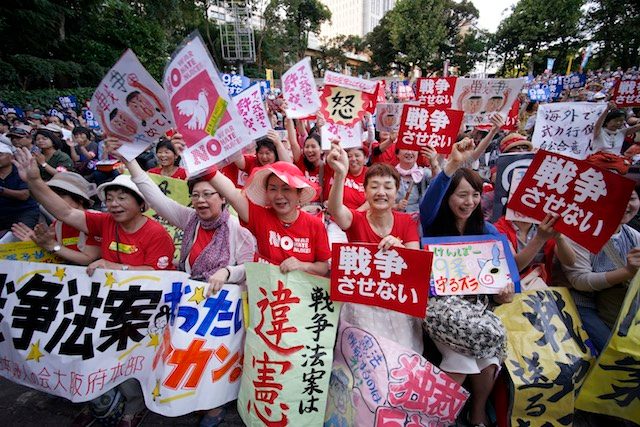SUMMARY
This is AI generated summarization, which may have errors. For context, always refer to the full article.

TOKYO, Japan (2nd UPDATE) – Controversial security bills that opponents say will undermine 70 years of pacifism and could see Japanese troops fighting abroad for the first time since World War II passed through the powerful lower house of parliament Thursday, July 16.
Prime Minister Shinzo Abe’s ruling coalition was left alone to vote after all main opposition parties walked out of the chamber in protest, a move intended to reflect widespread public anger over the legislation.
“The security situation surrounding Japan is increasingly severe,” Abe told reporters after the vote, in an apparent reference to the rise of China.
“These bills are necessary to protect Japanese people’s lives and prevent a war before it breaks out.”
The vote came a day after as many as 60,000 people took part in a rally outside parliament, after the bills – which will give Japan’s tightly-restricted military greater scope to act – were pushed through a key lower house panel.
There were scuffles as police pushed protestors back, and two men in their 60s were arrested on suspicion of assaulting officers, local media said.
Demonstrations in Japan are usually small and very orderly, but the issue has galvanized opposition across a wide swathe of the population.
The bills – a hotchpotch of updates to existing provisions that will allow, amongst other things, Japan’s military to take part in non-United Nations peacekeeping missions – now go to the upper chamber.
Abe’s Liberal Democratic Party (LDP) and its coalition partner have a majority in that house, but commentators say it is possible the chamber could reject, or amend the bills.
However, the lower house can overturn those changes with a two-thirds majority – well within the scope of what Abe controls.
The prime minister, a robust nationalist, wants what he calls a normalization of Japan’s military posture, which has been constrained by a constitution imposed by US occupiers after World War II.
Unable to muster support to amend clauses enshrining pacifism, Abe opted instead to re-interpret the document for the purpose of his bills, ignoring warnings from scholars and lawyers that his bills are unconstitutional.
Chaotic scenes
While Thursday’s vote represents a victory for Abe, there are growing signs that the campaign has taken a political toll – opinion polls show the vast majority of the public is against the bills, and Abe’s approval rating is dropping.
There were chaotic scenes in a parliamentary committee room Wednesday as opposition lawmakers thronged the floor in an unsuccessful bid to block the bills.
Dozens of politicians held signs protesting against what they said was the “forced” passage of legislation, in a way they say is anathema to the country’s pacifist constitution.
Lawmakers chanted “nay, nay, nay” and held posters saying “No to Abe politics”, and “No to a forced decision”, as their LDP colleagues pressed on with the vote, which they won comfortably.
Chief among the changes that the legislation will enable is the option for the military to go into battle to protect allies – so called “collective defense” – even if there is no direct threat to Japan or its people, something successive governments have ruled out.
Protesters, which include a large number of middle-aged and elderly people, say that provision will mean Japan gets dragged into American wars in far-flung parts of the globe.
But supporters say the bar for involvement in any conflict will remain much higher than for many other nations.
They say the legislation is needed to take account of the shifting security environment in Asia, where North Korea remains as volatile and unpredictable as ever, and China is increasingly perceived to be throwing its weight around. – Harumi Ozawa, AFP / Rappler.com
Add a comment
How does this make you feel?
There are no comments yet. Add your comment to start the conversation.